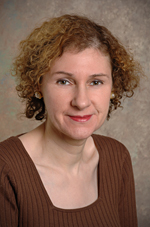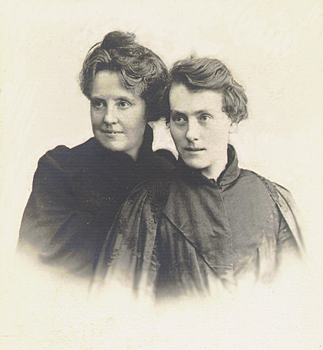Margaret Stetz, Mae and Robert Carter Professor of Women's Studies and professor of humanities at UD, and Cheryl Wilson, an assistant professor of English at Indiana University of Pennsylvania who got her doctorate at UD in 2005, have edited and produced Michael Field and Their World, the first collection of essays to be devoted to the couple's personal lives and works.
Contributors to the book include some of the most prominent Victorian and gender studies scholars and provide different perspectives on the writers' works and relationships with other notable artists and writers of the time.
Stetz said the book is based on a symposium at UD in 2004, “'Michael Field' and Their World: An Educational Weekend,” which was attended by scholars from as far as Australia and Japan. Stetz said the idea for the conference originated from the combined interests of herself and Mark Samuels Lasner, senior research fellow at UD's Morris Library, who designed the book's cover. Many of the participants in the conference contributed a chapter to the book, Stetz said, which took three years to put together.
“Bradley and Cooper are very fascinating because they are both a creative couple and a scholarly couple at a time when women were not supposed to be scholars and researchers,” Stetz said. “We tried to include a variety of essays based on the conference that refer the diversity of the lives and works of Bradley and Cooper.”
Stetz said late Victorian women writers have fascinated her since she was an undergraduate. “I've always marveled at the ways in which women who were not supposed to do things found ways to do them, and women who were not supposed to feel things, including belief in their own creativity, managed to express themselves,” she said. “I see the work on this volume just one more example of the thing that has always interested and inspired me.”
Wilson's interest in the genre also began as an undergraduate. She helped organize the 2004 symposium and wrote her dissertation on “Choreography and Counterpoint: Dance and Narrative in 19th-Century British Women's Writing,” co-directed by Stetz and Maria Frawley, a former English faculty member, which won UD's Wilbur Owen Sypherd Prize for outstanding dissertation in the humanities.
Stetz and Wilson's 24-chapter book takes an interdisciplinary approach to the women's lives and works, following the literary circles to which they belonged, as well as addressing their possible romantic affair. Journals kept by the woman give insight into their lives and interests, Stetz said, which include art, fashion, religion and philanthropy.

Both Bradley and Cooper had published individually, Stetz said, but they decided to publish together under the name “Michael Field” in the 1880s so that their book would get serious reviews. Stetz said the two published dozens of books together, and their work got favorable reviews until Robert Browning, a 19th-century poet, revealed their identity.
Stetz said the ladies had confidence in their writing and may even have considered themselves geniuses. “They always had a pen in hand,” she said. “They always thought what they had to say was important.”
While the name Michael Field was not really known a few decades ago, Stetz said there has been a resurgence of interest in their work, as well as that of other female writers of the time. “Now you cannot find any anthology of poetry and 19th-century literature that does not have their poetry,” she said. “But it's taken awhile for the critical attention to catch up with the process of bringing their work back to print.”
Wilson said she is very interested in the range of the writers' works and their ability to create and produce under different names. “That whole performance and the way they created that persona really fascinates me,” Wilson said. “For me, just starting a career, it was great to work with people who were so well-published and who are so established in their career.”
Stetz said Bradley and Cooper's poetry and plays were not only beautiful but also reflected the attitudes of the time. “Bradley and Cooper's lives are remarkable and quirky and the circle that they inhabited was a very important one that included figures such as Oscar Wilde, Robert Browning and some very good artists,” she said. “They did not fit anybody's image of a pair of Victorian ladies.”
Article by Julia Parmley, AS' 07



